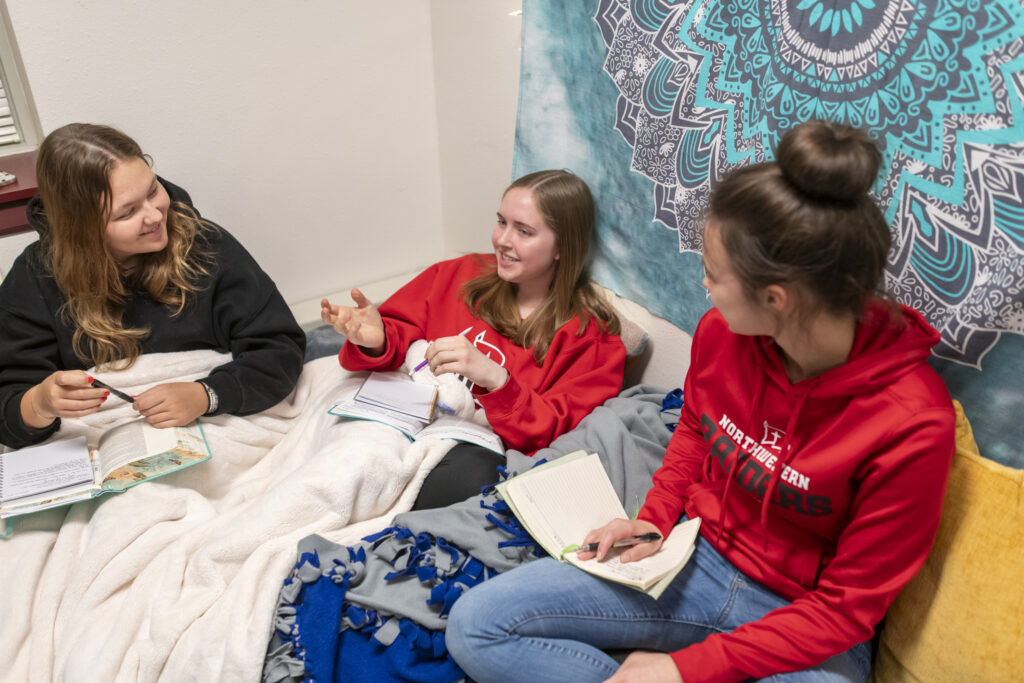One of the biggest Northwestern buzzwords is community. Marketing and admissions constantly emphasize NW’s community when recruiting new students, and SAC, SGA and Student Life work hard to live up to those ideals. The women’s retreat that took place Jan. 17 and 18 and the men’s retreat scheduled for Feb. 7-9 should be quintessential examples of this community that is so talked about. But do these retreats really live-up to the picture-perfect “Raider Family?”
While the men’s retreat is typically well attended, it is a bit more difficult to find students who have gone to the women’s retreat. Julia Boller said, “The women’s retreat in the past few years is not a super popular thing. There are people who go, and they always say it was a good time, but it did stand out.” Though Boller was interested in going this year since Michelle Christy was the speaker, she did not since she says, “The women’s retreat it was not an overnight thing. That aspect of it is missing, for a retreat you have to go somewhere.”
Boller speaks to that fact that this year, and in some previous years, the women’s retreat was held in a local church. There was programing on Friday, Jan. 17 before SAC BINGO and then more the following day. Male students have also acknowledged that the women’s retreat seems to lack a lot of what the men’s retreat has.
“I always feel bad talking about the men’s retreat because the men’s retreat feels much more privileged than the women’s retreat,” Collin Verschoor said. “We get to go to Okoboji for a whole weekend and women get to go to a church in Morris. It is not as much as a retreat and more like a conference for them.” This year the men’s retreat will be going to Okoboji once again.
Interestingly, the women’s retreat last year was an overnight event but was still not a memorable event for some. Nathania Smith said, “Last year we went to Kristin Brower’s family cabin, but we did the same thing we could have done at the church.” Kacey Zickefoose, who also attended last year, said, “Women’s retreat can be a really beautiful thing, but a lot of it is just saying Christian buzzwords and not ever being honest or saying something meaningful.”
Almost the opposite is said of the men’s retreat. “The men’s retreat is such a good time to hang out with other men on campus and get to know each other,” Verschoor said. “The men’s dorms can become echo chambers where they are very stuck with one another. This part of the year as a freshman, you can get very stuck thinking ‘I live in Hospers, and I think everyone who lives in Hospers is cool, but I don’t know anyone from the other dorms, so they probably aren’t as cool,’ which is just not true at all.”
Kyle Christy, who lives in North Suites, reiterates this. He said his highlight of the retreats is that he gets “to hang out with guys from Hospers that I normally do not get to.”
Overall, the men’s retreat is described as a time for playing broom ball and board games, eating junk food, having deep conversations late at night, building connections with other dorms and, according to Christy, an “unhurried, low-pressure space without expectations except for the expectancy that God can work in beautiful ways while gathering with men across campus.” But when it comes to the women’s retreat Zickefoose said, “Women should have fun, go on hikes and be outside too. I mean reading the Bible is good, but I think there is a way where we can make the women’s retreat exciting, so it is something they look forward to, but right now I do not know if we are there.”
Whether it is the location, programming or just student body perception that is the problem, it is clear that there is a big difference in students’ experiences of the men and women’s retreats. Both retreats are advertised as a time of fellowship, yet something about the women’s retreat does not seem to be working for a lot of students. Still, if students are looking for more community, they should consider attending a campus retreat. They probably will not regret it.

Photo courtesy of NW Mar Com.